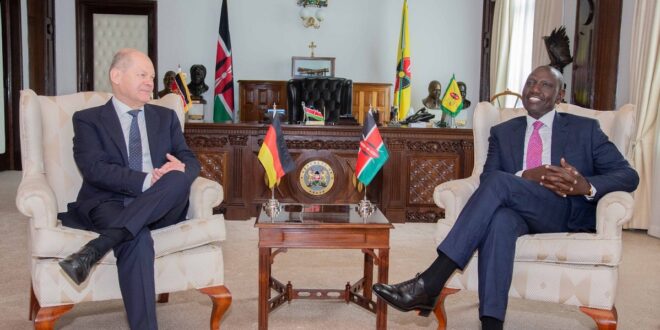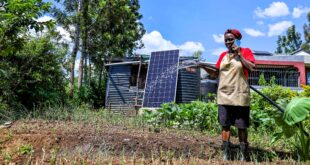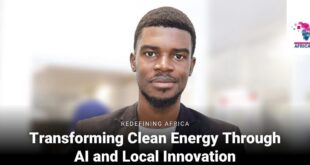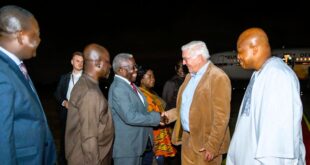Chancellor Olaf Scholz travelled with a trade delegation to Ethiopia and Kenya from 4 to 6 May 2023. Many important issues, including combating climate change, current conflicts in the continent and economic cooperation, were discussed in his meetings with with political leaders as well as representatives of the business community, civil society and culture. A special report on the Chancellor’s second visit to Africa since assuming office in 2021

On Friday (5 May), Chancellor Olaf Scholz held bilateral talks with President William Ruto at the State House in Nairobi. Germany and Kenya have a long-standing friendship. Scholz had received the Kenyan leader in Berlin only six weeks prior to his visit to the country.
According to the Chancellor, both countries have “further developed the bilateral relationship, cooperated in multilateral fora, but above all advanced the friendship between our two peoples and societies.”
It was therefore now right, as both emphasised, to give this partnership a strategic framework. The discussions were correspondingly wide-ranging: from combating climate change and Kenya’s role in security policy to economic cooperation and skilled labour immigration.
Kenya offers incentives to investors
President Ruto encouraged German businesses to explore the huge untapped investment opportunities in Kenya. “We invite them to take advantage of our country’s geostrategic advantage and use Nairobi as the hub for their regional forays,” he said.
“We commit to support German investors with incentives to engage successfully with investment opportunities in our country.”
Businesses in both countries are well connected, said Scholz. He therefore welcomed Kenya’s willingness to join the “Compact with Africa”, an initiative of the German G20 Presidency to strengthen private investment.
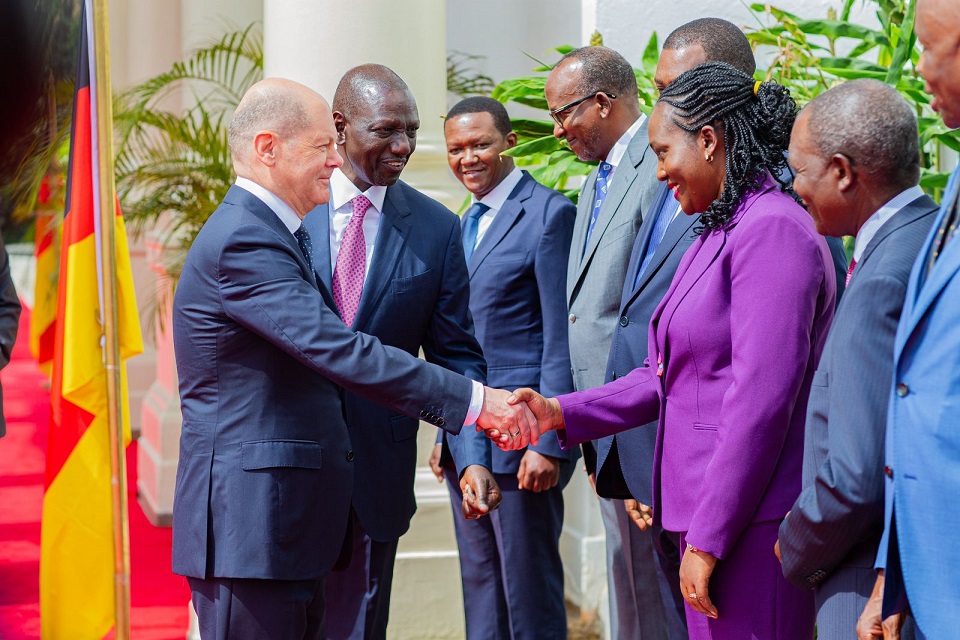
President Ruto introduces members of his cabinet to Chancellor Scholz before the meeting of both leaders in Nairobi/Photo: William Ruto
Kenya is Germany’s largest trading partner in East Africa, with bilateral trade worth over €400 million ($441 million) in 2020.
The Kenyan leader expressed his country’s commitment to the expeditious implementation of the Paris Agreement by its decision to join the Climate Club, a German G7 initiative that promotes the ambitious and rapid implementation of the Paris Climate Agreement.
Chancellor Scholz was particularly pleased with Ruto’s announcement that he would join the international Climate Club, underlining that Kenya already has a leading role in climate protection. The German leader was impressed that more than 90 percent of electricity generated in Kenya is already produced from renewable energy sources and that 100 percent is to be achieved by 2030.
Last year, Germany and Kenya agreed on a climate and development partnership to deepen cooperation on renewable energy, hydrogen and drought resilience in agriculture. Now the Chancellor also pledged further financial and technical support for Kenya’s hosting of the African Climate Change Summit, as well as for the Olkaria geothermal power plant.
Germany supports geothermal power plant
The Chancellor visited the geothermal power plant at Lake Naivasha as the last stop on his trip on Saturday. It is the largest in Africa. With the new pledge of another 45 million euros for the expansion of the power plant’s capacity, German support for it totals 215 million euros.
At the Olkaria power plant, the Chancellor pointed out the possibility of producing hydrogen and green fertilisers in addition to electricity – which is important for local economic development and at the same time has a good impact on the country’s climate balance.
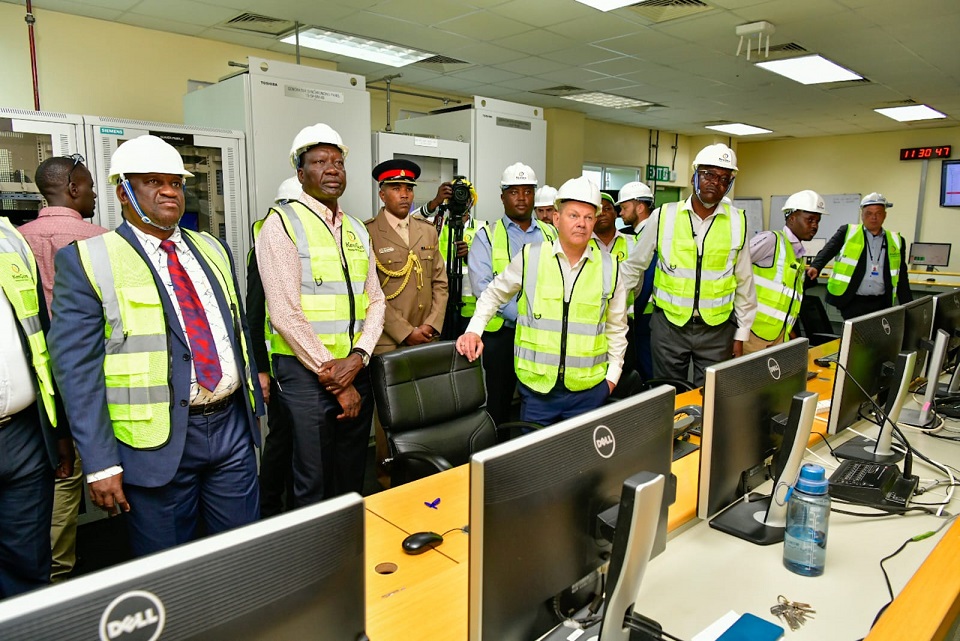
Chancellor Scholz and his delegation visit KenGen’s Olkaria Geothermal Power Plant. In addition to the power plant, KenGen also has other ongoing green energy projects that are a testament to Kenya’s commitment to sustainable development and the transition to 100% green energy/Photo: KenGen Kenya
Scholz also agreed with Ruto on the management of regional and global conflicts. At the same time, the Chancellor was also convinced that initiatives for peace and stability in Africa led by the African states themselves were particularly important.
Germany therefore greatly appreciates the mediation efforts Kenya has initiated. Among other things, the Chancellor emphasised Kenya’s recent involvement in the conflict in Sudan, where it was imperative that a transition to civilian government be achieved. Germany was happy to support to support these efforts, said the Chancellor.
The two leaders also discussed development cooperation and skilled labour immigration. There is also great potential for skilled labour migration in many sectors of the Kenyan economy, a point also emphasised by President Ruto. Germany therefore wants to create more regular, legal immigration opportunities for those who want to work in Germany, Scholz said.
The two leaders also exchanged views on how Germany could support the expansion of Technical and Vocational Education and Training in Kenya.
Germany to back G20 seat for Africa
Already on Thursday, the German leader had met with the President of the African Union Commission, Moussa Faki Mahamat, in the Ethiopian capital Addis Ababa where Chancellor Scholz kicked off his three-day trip to the region. Scholz held out the prospect of an AU seat in the G20 “in the not too distant future”, adding that “respect for the continent and its many states and also its growing population dictates that.”
South African President Cyril Ramaphosa had called for the inclusion of the 55-country bloc last year, and his proposal received swift support from US President Joe Biden and French President Emmanuel Macron as the West seeks to position itself as a partner to African countries amid growing competition with countries like Russia and China.
The discussion between the AU chief and the German leader focused on the various conflicts in the regions of Africa – above all the one in Sudan. Scholz emphasised the central role of the AU in peaceful conflict resolution and assured of Berlin support. He referred to the existing German contributions in other regional conflicts, such as in Libya or the Sahel region.
Mahamat said that the Commission was coordinating all efforts in resolving the situation in Sudan. He added that the African Union’s priority was to achieve a ceasefire, open humanitarian corridor and bring the various actors to the negotiating table. “There is no military solution except political solution that we can find,” he noted.
Also in Ethiopia, Chancellor Scholz met Prime Minister Abiy Ahmed, the head of the Interim Administration of Tigray Province, Gatchew Reda, and Ethiopian President Sahle-Work. During the talks, he called for the continuation of the peace process in the country.
Scholz urged Prime Minister Ahmed to ensure lasting peace in the country, particularly after the Tigray conflict, which has caused widespread death, violence and displacement.
Scholz said in a statement that Ethiopia “has made many strides in ending the civil war in Tigray”. It was only in November 2022 that the parties to the conflict agreed on a ceasefire after two years of a brutal war that killed thousands of people and caused a disastrous humanitarian situation and serious human rights violations. The war was primarily fought in the Tigray Region of Ethiopia between the Ethiopian federal government and Eritrea on one side, and the Tigray People’s Liberation Front (TPLF) on the other.
“I encouraged Prime Minister Abiy and the regional government to continue working for lasting peace and to deal with war crimes,” he said.
It was good, Scholz said, that it had been possible to de-escalate the war, but he noted that “orderly conditions are far from being restored”. The German leader therefore called for continued cooperation among the different ethnic groups in Ethiopia.
The two leaders also talked about the situation in Sudan.
Chancellor Scholz’s latest visit to East Africa is his second trip to Africa since taking office in late 2021, reflecting his view that the West needs to improve its ties with the Global South as the world becomes more multipolar. In May last year, he visited Senegal, Niger and South Africa in a three-day tour.
Femi Awoniyi with agency reports
READ ALSO German chancellor embarks on second visit to Africa
 THE AFRICAN COURIER. Reporting Africa and its Diaspora! The African Courier is an international magazine published in Germany to report on Africa and the Diaspora African experience. The first issue of the bimonthly magazine appeared on the newsstands on 15 February 1998. The African Courier is a communication forum for European-African political, economic and cultural exchanges, and a voice for Africa in Europe.
THE AFRICAN COURIER. Reporting Africa and its Diaspora! The African Courier is an international magazine published in Germany to report on Africa and the Diaspora African experience. The first issue of the bimonthly magazine appeared on the newsstands on 15 February 1998. The African Courier is a communication forum for European-African political, economic and cultural exchanges, and a voice for Africa in Europe.

